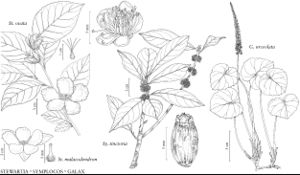Symplocos
Enum. Syst. Pl., 5, 24. 1760 ,.
Shrubs or trees, glabrous or hairy (hairs simple, 1-celled, with transverse septa); new vegetative growth from axillary and/or pseudoterminal buds. Branches smooth at maturity, glabrous or white or rufous-pubescent. Leaves often sweet-tasting; blade with marginal teeth usually glandular, apex acute to acuminate, midvein abaxially prominent, adaxially raised, prominent, or impressed [rarely flat]. Flowers fragrant; sepals imbricate; petals imbricate, white or yellow [pink, reddish, or lavender]; filaments glabrous [hairy]; anthers rotund-ovate to spheric. Drupes usually blue, sometimes orange to brown [white], crowned by persistent calyx; endocarp 1 [–5] -celled. x = 11.
Distribution
e, s United States, West Indies (Antilles), South America (Argentina), South America (Brazil), Asia (China), Asia (India), Asia (Japan), Pacific Islands (Fiji), Australia, temperate, tropical, and subtropical areas
Discussion
Species 318 (2 in the flora).
1 Leaf midveins impressed adaxially, blade margins closely serrate, serrulate, or dentate; inflorescences paniculate, usually internodal; flowers appearing with leaves; corolla lobes
2.5–5 mm; styles 2–4 mm; drupes bright blue to bluish black 1. Symplocos paniculata
Selected References
None.
Lower Taxa
Key
| 1 | Leaf midveins impressed adaxially, blade margins closely serrate, serrulate, or dentate; inflorescences paniculate, usually internodal; flowers appearing with leaves; corolla lobes 2.5-5 mm; styles 2-4 mm; drupes bright blue to bluish black. | Symplocos paniculata |
| 1 | Leaf midveins raised to prominent adaxially, blade margins usually obscurely crenulate-serrulate, teeth remote, sometimes nearly entire; inflorescences fasciculate, axillary; flowers appearing before leaves; corolla lobes 6-8 mm; styles 5-6 mm; drupes dark orange to brown. | Symplocos tinctoria |
